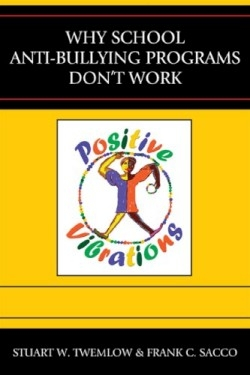Positive Vibrations
Why School Anti-Bullying Programs Don't Work
While school bullying has reached epidemic proportions nationwide, parents and administrators watch in horror, with little to offer in the way of successful solutions. Stuart Twemlow, MD, and Frank Sacco, PhD, pioneers in developing individual and community programs to deal with a variety of societal issues, have collaborated on a new approach to address this pervasive issue. Why School Anti-Bullying Programs Don’t Work is a comprehensive look at the myths related to past programs, and it presents a new, radically different program. Recommendations are based on the conclusion that successful behavior modification programs should focus primarily on how interventions are presented, rather than what is presented.
With an academic tone, each chapter tackles a challenging aspect of understanding bullying and violence, from “Myths, Fallacies, and Truths About School Violence” to “Understanding Power Dynamics, Power Struggles and Power Issues.” Drawing on numerous international studies, this book’s universal appeal is both provocative and in-depth. While uncovering the causes of bullying behaviors, Twemlow and Sacco examine the roles of students, parents, teachers, and administrators in creating a climate which fosters or does little to prevent bullying. In Chapter 8, “Discussing the Undiscussables,” the authors present a refreshingly honest analysis, explaining that some teachers anonymously admitted “bullying students was a hazard of teaching and that they had themselves taken on the role of the bully.”
With an extensive background in the treatment of family and community violence, Sacco has published numerous papers on bullying, as well as several videos on personal safety. He currently serves as the president of Community Services Institute, a private mental health facility. Twemlow is a professor of psychiatry and behavioral sciences at the Baylor College of Medicine, and has co-published a number of books including The Future of Prejudice in 2007. In addition, he currently directs the Peaceful Schools and Communities Project, a nationwide model for reducing school violence.
While this book is intended to serve a variety of audiences, the complex nature of the topic is best suited to those with a background in school violence and behavioral sciences. Chapter summaries provide a means to peruse the vast amount of research provided with ease, and with which to unravel the semantics of violence in our society. Those looking for answers to a complex issue in schools and communities will find this a rich resource for addressing both the dynamics and the personal nature of bullying.
Reviewed by
Amy Falberg
Disclosure: This article is not an endorsement, but a review. The publisher of this book provided free copies of the book to have their book reviewed by a professional reviewer. No fee was paid by the publisher for this review. Foreword Reviews only recommends books that we love. Foreword Magazine, Inc. is disclosing this in accordance with the Federal Trade Commission’s 16 CFR, Part 255.

